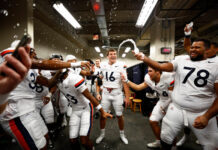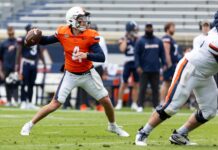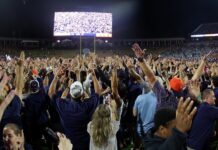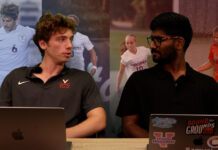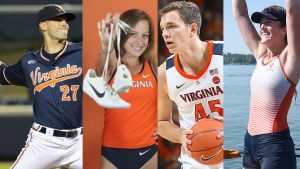
CHARLOTTESVILLE, VA – On 22 January 2020, the student-athletes of the University of Virginia were called into question regarding their academic commitment to the university.
These allegations prove false.
Virginia Athletics achieved one of the greatest years in UVA history in 2019 with two NCAA Championship titles for Men’s Basketball and Men’s Lacrosse; three ACC team titles for Men’s Lacrosse, Women’s Rowing and Men’s Soccer; a Runner-up finish in NCAA for Men’s Soccer and for individual Jack Mueller in Wrestling; a Final Four finish for Field Hockey and six individual ACC titles for Men’s Track and Field and a NCAA title for Jordan Scott. Men’s Tennis and Women’s Lacrosse advanced to the NCAA quarterfinals and Women’s Soccer sat in the number 1 ranking for eight weeks. Football broke the 15-year-long losing streak to Virginia Tech to win the Commonwealth Cup and advance to the ACC Championship game.
All done while these student-athletes obtained their highest GPA in UVA history.
Speaking to various student-athletes from different teams, and being on the Women’s Rowing team myself, I found a definitive agreement that UVA was chosen not only because it is consistently in the Top-3 for public schools, but also because of the personal achievement in obtaining a degree from such an academically prestigious school. “I think [UVA] is one of the best institutions in the country, not only in academics but also in sport” said third-year Basketball player, ACC Academic Honor Roll recipient and 2019 NCAA Champion, Austin Katstra.
Statistics from this past Fall 2019 show that the overall GPA average for the UVA Men’s and Women’s athletic teams was a 3.156, a UVA record. In the 2017-2018 academic year, UVA named 404 student-athletes onto the ACC Academic Honor Roll. This record was then broken again in the 2018-2019 academic year with 427 athletes on the Honor Roll.
Proof that we’re only getting better.
Deputy Athletic Director, Ted White confirms 484 student-athletes were on the Honor Roll this past Fall and nine teams earned their highest historical GPA including Football and Men’s Basketball, outliers in other institutions, but not at UVA. Comparing UVA achievements to any other school, regardless of their academic standing, is a disproportionate comparison.
Virginia Athletics releases a Student-Athlete Handbook as part of its Compliance to NCAA and ACC rules and regulations. These forms are signed by each athlete on every team, every year. The very first rule states: “Class attendance is mandatory” and continues until a bolded statement below states: “Failure to abide by these team rules could result in suspension from practice, suspension from competition, loss of all or part of any scholarship, and /or dismissal from the team.”
Doria Martingayle, a third-year Track and Field athlete and ACC Academic Honor Roll recipient explains, “it’s not like you have to be an athlete or a student, it’s literally student-athlete – you’re both” and continues, “you can’t do well in your sport if you aren’t doing well in the classroom.”
Each team is assigned an academic coordinator who is responsible for each athlete’s academic drive. They assist in tutoring and mentoring programs, help athletes strategize for assignments and provide advice on classes and schedules that best suit each athlete. “A key part of the puzzle academically for them is to try and figure out how to balance that athletic commitment with their student commitment,” said Baseball academic advisor Kate Stephenson.
Chesdin Harrington, a fifth-year on the Baseball team, named to the All-ACC Academic Team and ACC Academic Honor Roll as well compliments Stephensen’s help and contribution to his team as someone who “[is] really receptive and helpful in [the academic] process as someone who could share a lot of information about what I was experiencing my first Fall and throughout my career.”
Harrington served as the President of the Student-Athlete Advisory Committee (SAAC) who works alongside the Administration and Director of Athletics Carla Williams in serving and caring for the student-athlete community and facilitating discussions about ideas like the Master Plan.
The Virginia Athletics Master Plan includes the renovation and construction of facilities funded by donors and alumni to the Virginia Athletics Foundation. Money that is trusted solely to Virginia Athletics and their achievements. This plan not only includes the enhancement of facilities for athletes but the introduction to The Center for Citizen Leaders and Sports Ethics which will provide UVA’s athletes with resources in career, leadership and academic development.
Harrington described the idea as “impressive” and believes, “this administration is doing everything that they can and more to ensure that student-athletes are getting the development they need outside of athletics to be successful when they leave here.”
The stigma associated with athletes is based on their purpose in coming to college and their apparent lack of effort once accepted. Athletes from teams that have a professional level after graduation, those like Football, Baseball or Basketball are expected to be equipped with a backup plan, that being like athletes from other sports and non-athletes as well: a strong academic standard that affords them the opportunity for work.
Harrington reminisced that “every young kid’s dream when playing a sport typically wants to play at a professional level and that’s not to put any pressure on anybody” he continued, “this has to be a forty or fifty-year decision, this is not a ‘what’s going to be a cool 4-year experience’.”
Athletes benefit from a skill set much different from non-athletes that is practiced in an everyday setting and benefit them in their career aspirations – skills like teamwork, time management, goal-setting, and being able to work under stressful conditions. Through tough schedules of classes, practices, and competitions, there is a force to find time for work.
“A lot of people, when you look around the bus or on the plane are doing their work while we travel or in the lobby of the hotel the day before the competition,” says Martingale. If student-athletes are unable to take a test due to competition, their academic coordinator will travel with the athletes to distribute the tests and make sure the students are abiding by the Honor Code and chaperone their test-taking.
Harrington reiterated, “if you had all those things weighing on you, it makes it really difficult to perform.”
College athletics provides the opportunity for those who otherwise cannot make it into prestigious schools – people of a disadvantaged background, foreign students, talented athletes. It extends a hand to those who deserve it and who’ve worked for it. Martingayle confirms, “I know so many people who have to go into sports because it’s not an option for them to go to private school, to go to some school and get tutors and stuff.”
As an international student from South Africa, I was given the opportunity to come to UVA by Virginia Athletics – something I am proud to have earned but also something I will be grateful for, for the rest of my life. I do not take this experience for granted. This is an opportunity to work in one of the strongest nations in the world, to be taught by some of the most successful people in the country, therefore, allowing myself to not care about my academics is disrespectful to the work I’ve put in to get here, and disrespectful to UVA for extending the helping hand that has changed my life.
Katstra summed up the ordeal perfectly, “it’s not important to say ‘oh well I’m an athlete I learned these things so I’m more qualified for a position’ or vice versa and so I think that it is important that you learn from each other and acknowledge the fact that you had different collegiate experiences.”







